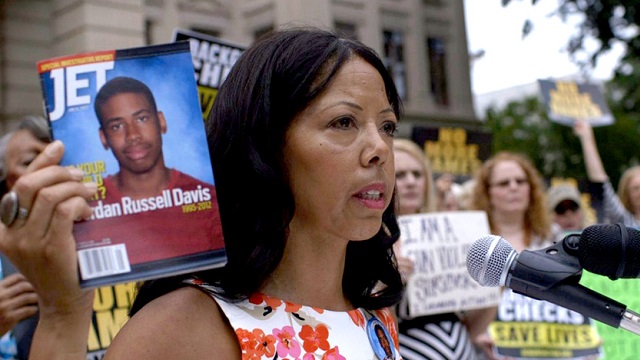On November 23, 2012, Jordan Davis was a passenger in a red SUV. Being teenagers, they were blasting their music when they stopped at a gas station to grab some snacks. Michael Dunn asked them to turn it down. Minutes later, Michael Dunn was shooting up the SUV, murdering Jordan Davis, and injuring his four friends.
Michael Dunn’s trial for his murder of Jordan Davis was a zeitgeist grabbing moment, being the second high profile shooting of an unarmed black teenager by a white man using Florida’s Stand Your Ground laws as a defense. The first murder, that of Trayvon Martin, happened in February of 2012 with a trial in June 2013 culminating in an innocent verdict. The trial of Michael Dunn happened in February 2014.
The judge ruling over Dunn’s trial allowed cameras into the courtroom, allowing director Marc Silver to set up his camera and take footage of the proceedings. This isn’t really Marc Silver’s movie. This isn’t Michael Dunn’s movie. This is barely Jordan Davis’ movie. 3 1/2 Minutes, Ten Bullets is actually Ron Davis’ movie as a testament to his slain son.
Eschewing any and all pretense of a balanced worldview, 3 1/2 Minutes presents a portrait of the struggles to be black in modern “post-racial” America. Ron Davis had a son who had no criminal record, did well at school, and in a flash he was murdered. Ron, and his ex-wife Lucia McBath, had to suffer their loss in the public view in order to rally for justice, but also to expose the tensions felt by the Black community.
They use 3 1/2 Minutes as a trial of America. The last hour+ of 3 1/2 Minutes is a round robin of courtroom footage, personal reflection, and the public response from a conservative call-in radio show. The net effect is Jordan’s death isn’t just a fluke caused by a single crazy white man, but the result of a systemic racial divide that demonizes the Black community, thereby creating a tacit just cause to the harassment and murder of black people.
Does it entirely work as a movie? That might vary depending on your tolerance for documentary meandering. The emotional reflections are sometimes highlighted by abstract images bordering on indulgent. The cliche image of a man diving into a pool and sitting underwater could easily be considered overused and ineffective. The call-ins to the conservative radio show seem like they’re making the redundant point that racism is alive and well on a national scale.
When I saw 3 1/2 Minutes, these flaws felt moderately significant. I had wanted to see more footage from the courtroom, as much as they could give. I wanted more about the media circus. The conversation felt urgent, but the need to tie this single instance to the national conversation felt heavy-handed if not obvious.
Today, in the immediate wake of the Charleston Church Shooting, I’m second guessing myself. I’m writing this review on June 19, less than 48 hours after a 21-year-old white kid murdered 9 people in a predominantly black church. In the wake of this gruesome act of racial terrorism, I can’t help but see the various ways that the national conversation is playing out. Excuses for mental illness have been trotted out, the pain of the Confederate flag is being dismissed, people have pondered if this was an attack on Christianity. The national conversation has bent backwards to dismiss the racial motivations of the attack in its attempt to claim that race still isn’t a problem in America, even in the face of evidence given by the terrorist and his roommates.
In the wake of this terrorist act, where the struggle isn’t even about the solution but about the need to even have the conversation, suddenly the portions of the radio show take on a greater significance. Of course this conversation needs to happen, and this is why we’re not having the conversation. This is what the conversation is up against. Yes, I still want to watch more courtroom footage, but I suddenly have a new found love for the radio call-ins.
3 1/2 Minutes, Ten Bullets may not be perfect. It’s more artistic than expected, generally eschewing the boring talking heads techniques. The pacing might be slightly off. It might be a bit more indulgent than desired. Trumping all of that, 3 1/2 Minutes is an important conversation about racial difference in modern day America.

